The advancement of technology and creation of social media has attracted millions of people to become digital members.
Have you ever wondered how does digital resident share stories (of them or others) or how does digital visitors search for information?
For posts to go viral, the content owner have to change the settings to ‘public’. Besides, it is basic ethic for another website to seek approval from the owner before sharing on its platform.
For example, ViralThread is a social sharing company that post viral videos daily. However, for all the videos that they posted, they will ensure that proper credits are done.
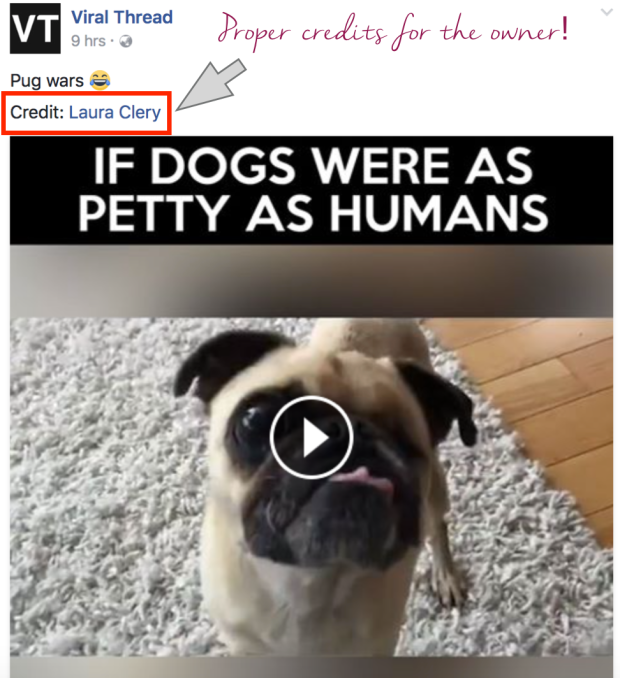
Source: ViralThread – Facebook, Image edited by me
So, why do people want to publicise their online content and make it free?
The reason for the above actually all boils down to the social sharing behaviour.
Why do people want to share information?
Through sharing, it will helps one to achieve self-fulfilment, sense of belonging or to spread word about a cause or show support (Garrett Moon, 2014).
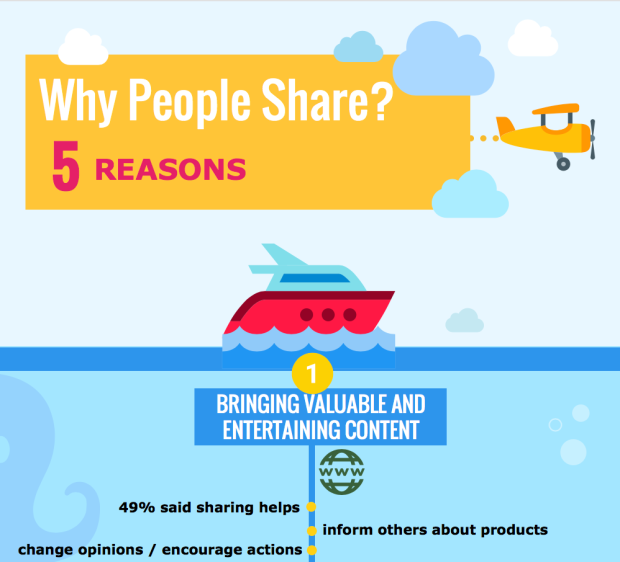
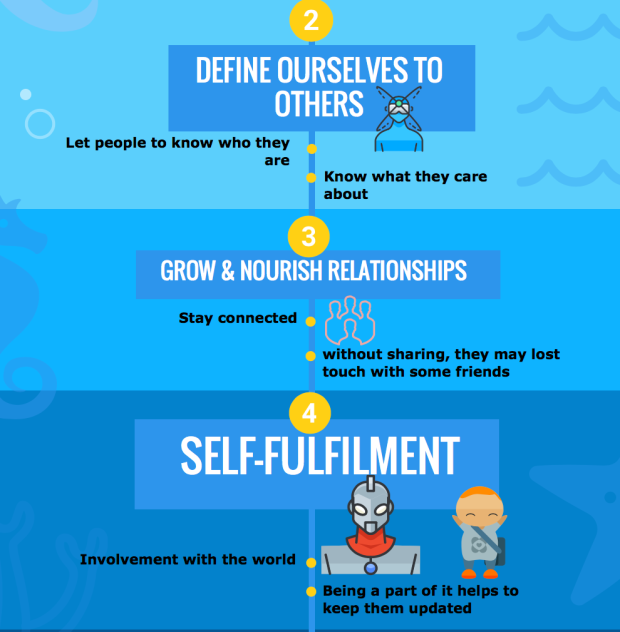
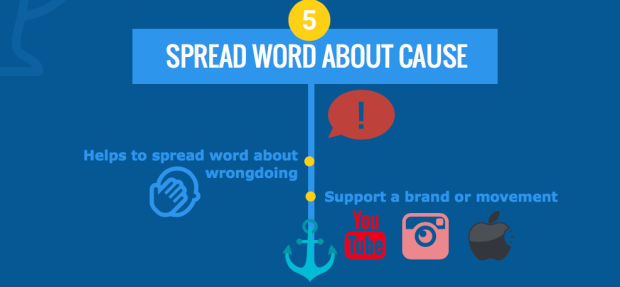
Source: Garrett Moon, graphics by me
The pros for content producer of making their materials ‘shareable’ at $0?
A great example of a content producer is a Youtuber. Almost anyone can upload a video on YouTube and allows others to view and share it. YouTube has successfully build a career path for many musicians, such as Sam Tsui and Kurt Schneider. Their persistence of uploading covers of hit songs on YouTube have helped them to gain recognition (David, 2016). With the help of Youtube, a platform for digital members to upload and watch videos for free, it has helped many to pave a promising career.
Source: GMA Network & Wired, video done by me
So, isn’t it interesting how a content owner can upload and make their content free for all, yet they are earning money from doing it!
But, what about the dark sides of allowing free access to the owners’ contents?
Companies have utilise social media and perform promotional activities on it. With it, they can easily track the views and area of exposure.
However, also with social media, the moment an advertisement consist of incorrect information, it can damage their reputation quickly.
For example, the case of Saffron Sharpe (fashion influencer) in Singapore. Toggle has uploaded a preview of its ‘Fashion Police’ (free access for all), but within hours it has been shared widely and receive criticism from the public (Coconuts Singapore, 2016).
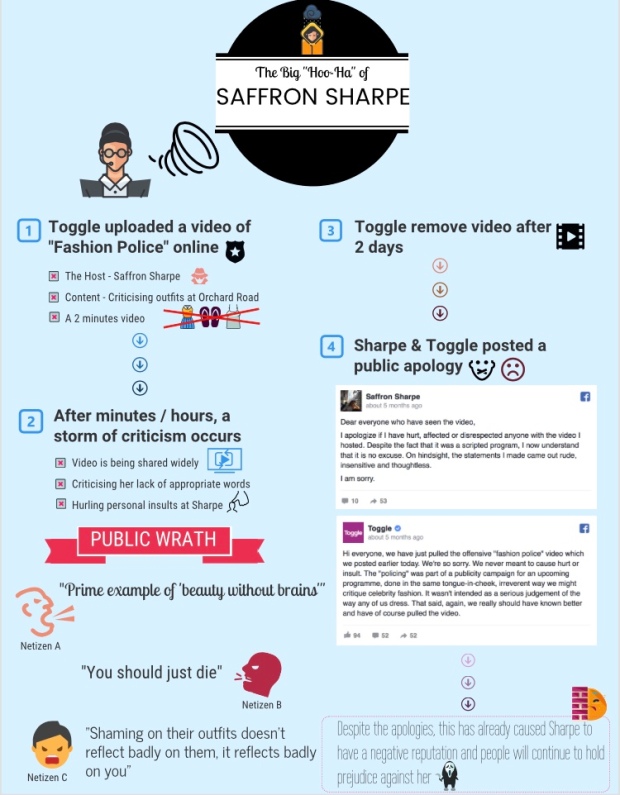
Source: TNP Article 1 & TNP Article 2, infographic created by me
Source: RP DMC
The case of Saffron Sharpe has taught us a lesson that free-sharing content may cause the owner to receive public shaming.
Or, in the case of Justine Sacco, the owner of a racist tweet, has been shared by Sam Biddle which has brought her global attention that ultimately led to the outcome of losing her job (NY Times, 2015).
In conclusion, by making online content ‘free-for-all’ can create a path for talents and allow them to achieve a unique career experience (e.g. Ladyironchef). However, the lack of exercising digital ethics (refer to Topic 4) may lead to the fall of an individual.
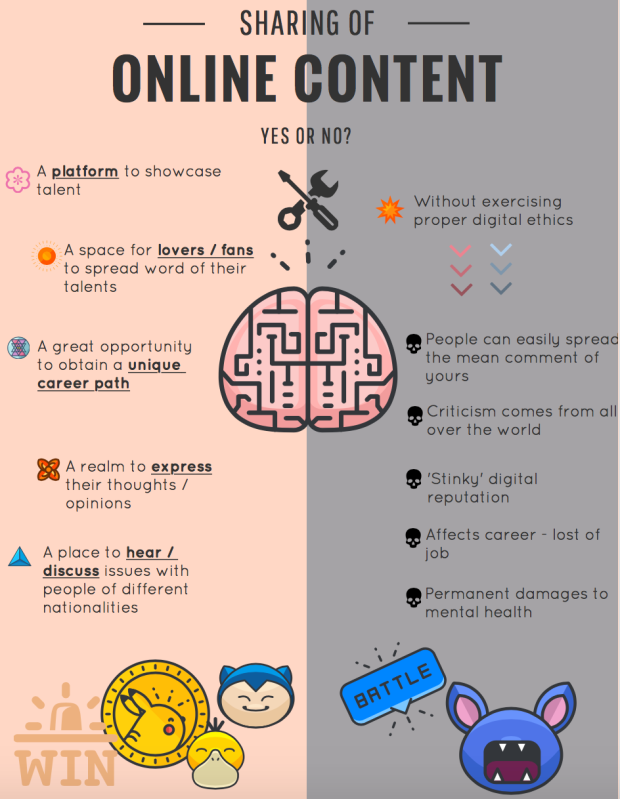
Infographic created by me
(word count: 413)
References
Garrett, M. (2014). Why People Share: The Psychology of Social Sharing. [Online] Available at: http://coschedule.com/blog/why-people-share/ [Accessed on 15 November 2016]
David, P. (2016). Kurt Schneider: The Chessmaster who turned into the King of Youtube Music. [Online] Available at: https://www.wired.com/2016/06/youtube-superproducer-kurt-hugo-schneider/ [Accessed on 15 November 2016]
Coconuts Singapore. (2016). Toggle pulls down their corresponding “Fashion Police” video due to overwhelming flak. [Online] Available at: http://singapore.coconuts.co/2016/06/29/toggle-pulls-down-their-condescending-fashion-police-video-due-overwhelming-flak [Accessed on 15 November 2016]
Jon, R. (2015). How One Stupid Tweet Blew Up Justine Sacco’s Life. [Online] Available at: http://www.nytimes.com/2015/02/15/magazine/how-one-stupid-tweet-ruined-justine-saccos-life.html [Accessed on 15 November 2016]

Hi XinHui! Using social media as an example of open access is a very unique perspective. As you have mentioned, people share things for free as “Through sharing, it will help one to achieve self-fulfilment, sense of belonging or to spread word about a cause or show support”. This shows that open access allows more information to spread and increase awareness. I personally find many of such videos on social media which has useful information that I have never knew before.
You have also mentioned several cases in which allowing open access has backfired. Examples such as Saffron Sharpe is easy to relate to. The graphics that you have made also helped me understand the topic better. Allowing open access for online content can backfire easily as you have shown. It is important to be sensitive over what we share online,
What do you think are the benefits of authors allowing open access on their work online?
Thanks XinHui! STAY FUNKY.
LikeLiked by 2 people
Hi Sean,
Appreciate that you have taken your time out to read and comment on my post ^^
And yes, social media is a platform that are constantly displaying important knowledge that we all ought to know. I’m glad that the infographics got to be of help 🙂
For authors to have open access for their online content allows their work to be constantly “shared” with others, which cause the works to receive a lot more attention. Especially, if the authors managed to make a really impactful content, it may even go viral. All these can help the authors to gain recognition too!
THANKS FOR COMMENTING, SEAN :)))
STAY P O L I T E! ^^
LikeLike
Hello XinHui!
I’m once again awed by your creativity especially when you self designed the infographics and video. It sure allowed me to better understand your points and open access.
I do agree with you on the points mentioned on why content producers share their work online. It allows a platform for these producers to share their ides and passion and spread them around the world. Social Media like YouTube is definitely a great way to express themselves and to showcase their talents.
Through videos on YouTube and facebook, I am amazed at the amount useful information I’ve not heard of and I am really glad these information are put open access, allowing me to broaden my horizon.
You did mentioned that youtubers are able to pave their career path through their videos. By getting sponsors and partnership, these youtubers are able to make a living out of the contents they produced. But what about authors the create research content and information for us? With open access, authors still have to fork out their research and publication fee. Is this still beneficial to them??
I would like to hear your point of view! Nevertheless, great work XinHui!! 🙂
– Yang Ting 😀
LikeLiked by 1 person
Hi Yangting,
Thanks for the comment and praises you have of the infographics! (hehehe) ^^
And yes, with the integration of social media into our lifestyle, this has led to the learning of new knowledge to be through social media too.
Thanks for pointing out about the researchers, this is a portion that I have neglected about in my post. However, after reading you all’s blogs, I have managed to put it into my reflection post.
My response to your question is also in there!
Be sure to check it out to find out about my answer 😉
LikeLike
HI Xin Hui,
I must say your post really enlighten me on a new perspective of how users like us can benefits and harm from usage of free content online! Being a digital citizen myself, I agreed to the fact that ‘social sharing behavior’ do shape us as to what we are today, hence promoting our willingness to share for free. Understand that sharing freely helps to disseminate information out to more and raise awareness, it might not be sustainable in the long run, especially in business prospect where businesses still need to incur publication fees for posting their articles/ads online. Ultimately, they want to earn from its consumers. However, with content published every seconds online(https://www.quora.com/How-many-news-articles-are-published-online-everyday), providing free content can attract but hard to retain loyal customers with so many alternatives available. Thus, do you think marketers/businesses should still adopt ‘open access’ as they choices for publications?
Thanks for the interesting read! Cheers!
LikeLiked by 1 person
Hello Wendy!
Thank you for reading my post and posting such a great comment ^^
I’m glad that you have mentioned about the social sharing behaviour and how it affects the dissemination of information, or how an article can garner attention.
And the answer to your question is YES! Businesses should definitely still adopt ‘Open Access’, this is actually the most applicable for the biz nature of e-commerce. With open access, e-commerce can easily share its newest product/promotion (these are online content too!) easily online. Also, it actually receives reviews and feedbacks which put a stronger emphasis on the benefits of the product. All these will actually benefits a business in more ways than one!
LikeLike
Hey XinHui! Informative graphics you got there! 🙂
I agree with you on the reasons for sharing content online and that it is very important for proper citation to make the virtual world remains a conducive and ethical place for sharing freely.
Content producers have the freedom of speech and have to be responsible for what they create/write. Like the case of Saffron Sharpe and Justin Sacco, where sharing of one’s opinion can be detrimental and offensive, how do you think content producers can take precaution with what they share online so as to not fall into the lack of digital ethics? YouTube’s policy of demonetizing videos had sparked an uproar about the restriction of freedom of speech concerning advertisements on YouTube.
Do you think the freedom of speech is one of the pros of content producer or do you agree with what YouTube had imposed? Will be glad to hear your view! 🙂
(http://www.independent.co.uk/news/people/philip-de-franco-youtube-clarifies-policy-accused-censorship-monetisation-advertiser-friendly-a7223866.html)
LikeLiked by 1 person
Hi Charissa!!
Thanks for sharing the article and giving me an intriguing question!
Hmmm, I’m leaning towards the side of what YouTube has imposed. Firstly, I agreed to their actions as social media has taken over the life of many individuals, especially youth or children starting from the age of 5. Hence, it is of utmost importance to exercise appropriate language to prevent children from learning ‘bad influence’. Especially at the age when they still can’t differentiate what’s right and wrong, what’s humour and what’s not.
However, instead of demonetising the YouTubers’ ads, they could actually approach this issue differently.
For example, for all users accounts, their D.O.B. have to be indicated and for inappropriate video contents, they can place an age restrictions on it. IN this case, YouTubers can still earn from their content and viewers are of the appropriate age too.
Once again, thank you for reading and taking the time to comment on my post! :)))
LikeLike
Hello, Xinhui!
Interesting approach on the topic of free online content, this have definitely opened a new perspective for me to this topic. As a frequent user of YouTube, the example you have used on are really relatable.
With the help of social media, content creators are able to share what they loved to do and express their thoughts/opinion. However, what are your views on social media turning its back on content creator for more monetary benefits? Eg. YouTube Red to remove / privates its content creators’ video if they failed to subscribe to YouTube Red plans?
The source of income YouTubers mainly received are from advertisement and sponsorship, with YouTube Red as an ad-free platform how impactful will this be? Would YouTubers still want to share on YouTube? Just some food for thought.
http://gizmodo.com/youtubers-are-up-in-arms-about-youtube-red-1738022087
Cheers,
YY
LikeLiked by 1 person
Hellu YY!
Thanks for the interesting question! I actually didn’t have any background knowledge of YouTube Red and am glad that you pointed it out to me 🙂
And yes, I think YouTubers will still continue to share their content online. As mentioned in the article that you shared, by having subscribers can actually help content owners to earn more than thru ads. I think the main reason that YouTubers are complaining about YouTube Red is due to the approach that YouTube had used, which caused conflicts to occur.
LikeLike